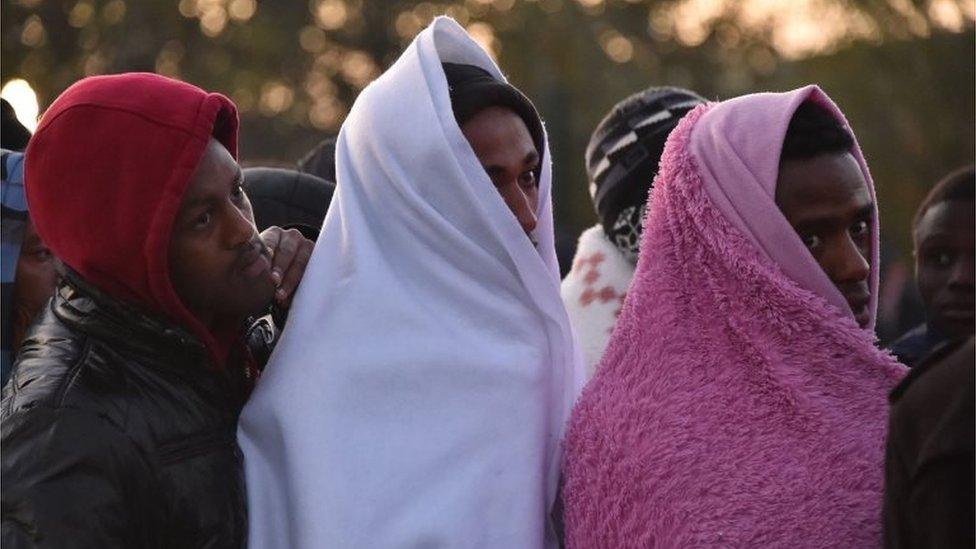Volunteering in Calais: The impact of the Jungle
- Published
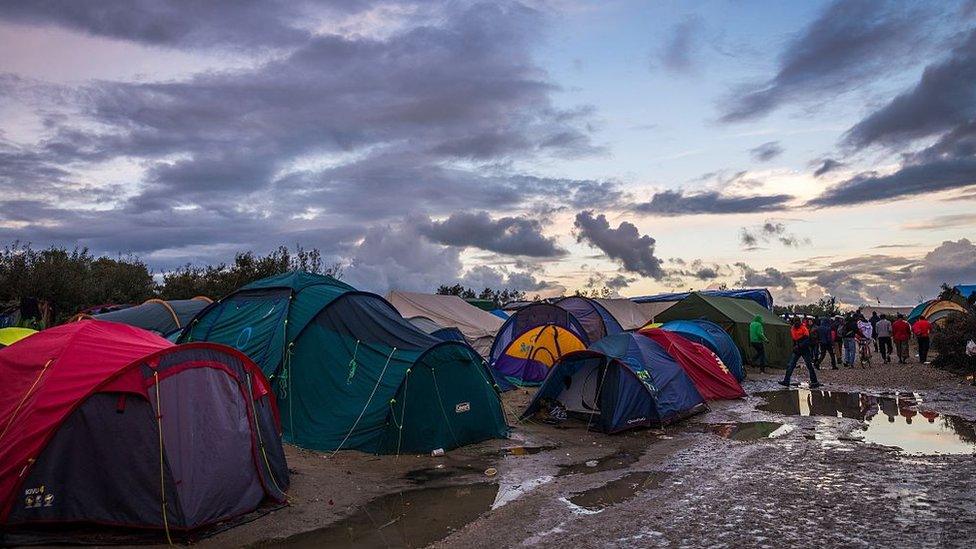
Tents in the Calais Jungle camp.
What would you give up to help people in distress - time, money, your marriage?
For the volunteers who have worked tirelessly in the Jungle camp in Calais, that question is not an intangible abstract but a real issue.
Helen, who asked that her surname not be included, is 28. She works in a residential care home for young people and children in south Wales, where she lives with her two young children, and has been volunteering in the camp for the past year - a year in which her life has changed completely.
In July 2015, 2,000 people a night were trying to get across the Channel in search of a better life in the UK.
By October, 16 people had died attempting the crossing and the population of the camp had soared to 6,000. Helen felt she had to do something.
She asked her sister-in-law, who was already volunteering in the camp, if she could tag along on her next visit.
"I thought I would like to go there for one weekend," Helen said. "I thought I would do something to help and then come back home to normality."
But on her first visit to the camp she quickly realised that she would be back.
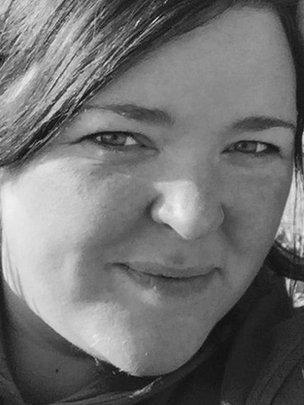
Helen has spent thousands of pounds volunteering in Calais
Overwhelmed by the sheer number of people and the conditions they were living in, she was nonetheless inspired by the sense of community she discovered.
It was, though, a chance encounter with two teenage boys - themselves in the Jungle for the first time - which cemented her resolve to return.
"They had arrived in the Jungle that day and only had the clothes they were standing up in," she explained.
"Both looked so tired and so drained from the journey.
"I made sure they had a tent, sleeping bags and warmth.
"Seeing the smiles on their faces was an amazing feeling for me but I couldn't help feeling guilty when I returned to the hotel for the night and slept in a nice warm bed with clean sheets and fluffy pillows, knowing that I had left these two children in the horrendous conditions of the Jungle.
"The next day when I went back to the camp I went to find the boys. We exchanged numbers and I offered to help them in any way that I could."
Since that first visit, Helen has been back to Calais once or twice a month - about 15 times in all she thinks - and she would always make sure that she saw the boys when she did.
At home, she spoke to them often on the phone. If they needed anything she would buy it and bring it with her on her next trip to France.
Relationship breakdown
She has spent thousands of pounds volunteering in Calais - all completely self-funded.
But it was at home that her voluntary work exacted a heavier toll.
She married her husband eight years ago and they had two children together, but they could not agree about her work in Calais.
Helen said her relationship was already struggling, but this disagreement "put the final nail in the coffin" and she divorced him.
"The impact of volunteering has been massive," she said.
"There have been times when I have put Calais before everything, before my children, before my work, before my family. And this has a knock-on effect on everyday living.
"One day, I got a call at 5am from a young man I had met in the camp. He was in Swansea after crossing over to the UK so my sister-in-law and I went to pick him up.
"As soon as he got into the car we phoned the Home Office to start the asylum process.
"He lived with my sister-in-law for eight months, before he was deported to Holland."
New love
But the impact of her voluntary work does not end there.
She had been volunteering in the camp for about five months and working in the medical caravan when she met a man with whom she would quickly fall in love.
He was an interpreter, a resident at the camp, from Afghanistan, who was volunteering as a translator while he waited for an opportunity to come to Britain.
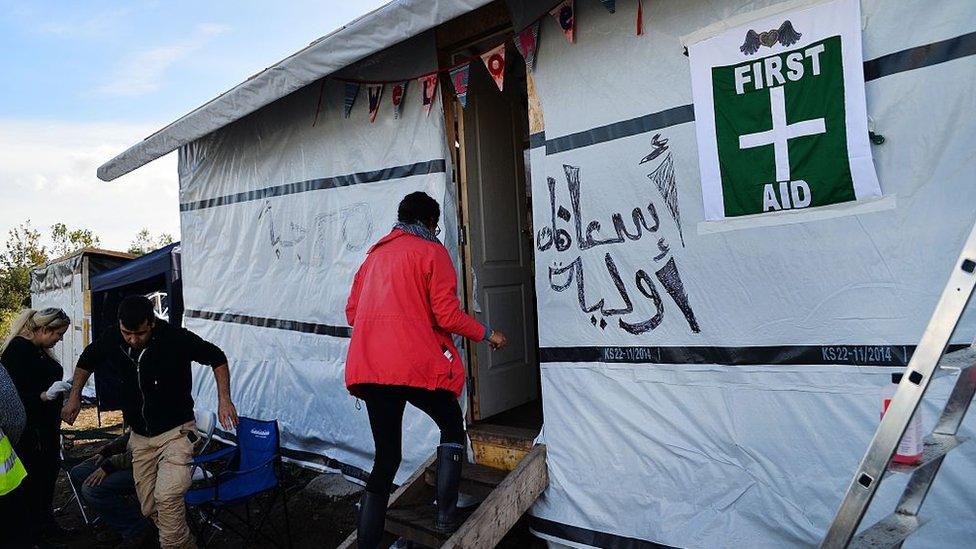
Helen and her new partner met in a medical centre in the Calais camp.
"He would come to translate for the British doctors as he can speak four languages," she said.
"There was no payment. I think he was so bored in the Jungle that he just went to translate.
"We spent some time when it was quiet speaking about different things, mainly about Islam and cultural differences.
"From that day that I first met him we've literally spoken for hours every day.
"Every time I went to the Jungle I would arrange to meet him there."
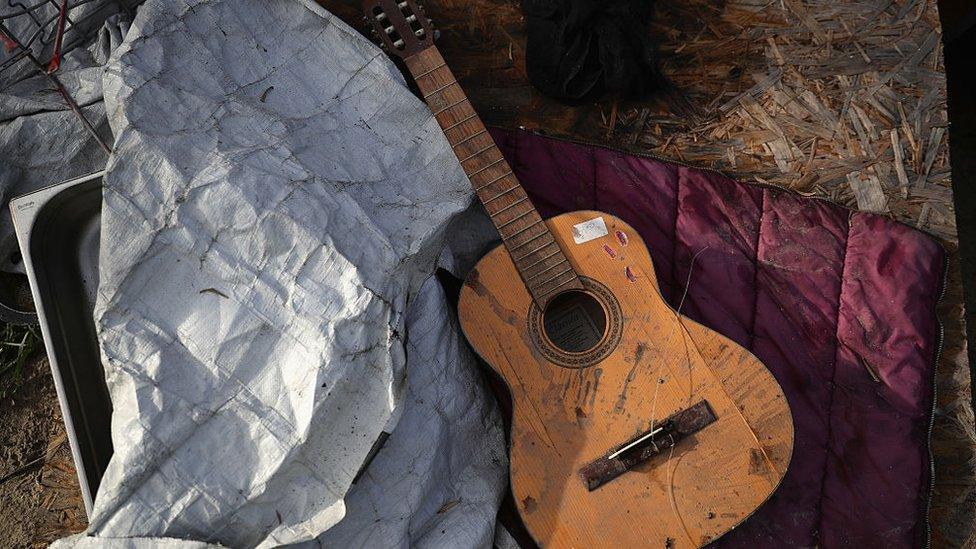
Belongings left behind after the Calais camp was cleared by French authorities.
Now that the camp is closing, Helen's partner has been moved to Lyon. He loves it there - he is sharing a house with proper beds and cupboards filled with food. But she knows that he cannot stay there.
Though he has family in the UK, his journey to Calais came via Italy and he will be deported when the French authorities ask him to claim asylum because he does not have the right papers.
And that, Helen says, has put its own strains on their burgeoning relationship.
"Everything's had to become a lot more serious a lot faster," she said.
She is hopeful that he would be able to get a visa to come to the UK from Italy, but marriage is their only option if he is to stay.
"For him to be able to legally move to the UK I would have to marry him within three months of him getting here.
"Everyone says I'm crazy but it's the only legal way he can come here.
"And it's going to be different living with him than going for a long weekend every month.
"We're both going to have to adapt."
As for her voluntary work, Helen feels like she has done what she can for now.
"It's so emotionally draining that I need to take a step back and concentrate on my family - working on my relationship with my children and helping my partner to come here legally.
"I will be doing everything I can for the people I've met in the Jungle, but from now on I'll be doing it from the UK."
Chris Bell, BBC UGC and Social News team
- Published28 October 2016
